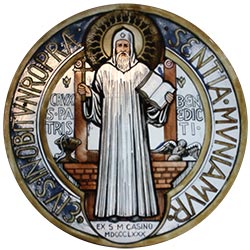 Today, July 11, is the feast of St Benedict (480 – 547).
Today, July 11, is the feast of St Benedict (480 – 547).
Benedict describes a “middle way”, via media, bringing together positive ends – not either/or, but both/and. Community and solitude. Prayer and work. And so forth. He has a stress on the daily office, and on reading the scriptures in such a way as to hear what the Spirit is saying to us through them (lectio divina).
Anglicanism/Episcopalianism is a denomination that can be seen as strongly “Benedictine” – probably because England had such a strong Benedictine presence. It regularly is seen as a via media – not a half-way-between, but a both/and denomination (a platypus which some struggle to understand – just as many did not believe the platypus, when discovered, was a real animal). Every Book of Common Prayer and its many contemporary revisions give significance to the daily office – a tradition not just understood as being the preserve of clergy, monks, and nuns, but of the whole people of God. Anglican church buildings regularly are laid out in Benedictine fashion, with choir stalls as in a monastery.
Many saints are known for the events of their life. Much of Benedict’s life comes to us through legends. He does give us his Rule for a Christian community of monks. The Rule is followed by “Benedictines”, Cistercians, and many others. It is followed by many in adaptation in ordinary daily life beyond cloister walls. I am an Associate of Kopua monastery, the Cistercian monastery in New Zealand.



i enjoy this poet’s work very much. He apparently has no abjection to them being distributed for Christian edification.
A sonnet for St. Benedict
by malcolmguite
20130710-093249.jpg
On July the 11th the Church celebrates the feast of St. Benedict of Nursia, the gentle founder of the Benedictine order and by extension the father of Monasticism. A moderate and modest man he would have been astonished to learn that his ‘simple school for prayer’, his ‘modest rule for beginners’ led to the foundation of communities which kept the Christian flame alight through dark ages, preserved not only Christian faith, scripture, and culture,but also the best of Classical Pagan learning and culture, fed the poor, transformed societies, promoted learning and scholarship, and today provides solace, grounding, perspective and retreat not only to monks and nuns but to millions of lay people around the world.
Here is my sonnet for Benedict, drawing largely on phrases from the Rule, I dedicate it to the sisters at Turvey Abbey. It appears in my new book with Canterbury Press, The Singing Bowl
Benedict
You sought to start a simple school of prayer,
A modest, gentle, moderate attempt,
With nothing made too harsh or hard to bear,
No treating or retreating with contempt,
A little rule, a small obedience
That sets aside, and tills the chosen ground,
Fruitful humility, chosen innocence,
A binding by which freedom might be found
You call us all to live, and see good days,
Centre in Christ and enter in his peace,
To seek his Way amidst our many ways,
Find blessedness in blessing, peace in praise,
To clear and keep for Love a sacred space
That we might be beginners in God’s grace.
It might interest readers to know that the present Archbishop of Canterbury, The Right Revd. Justin Welby, is a fan of St. Benedict. He has a small inter-denominational religious community living with him at Lambeth Palace. He has a Roman Catholic spiritual director and affirms the religious life within the Church.
Blessed Benedict has a lot to answer for! TBTG!
A very worthwhile reflection. I am most grateful!
My one quibble is that Anglicanism is not a “denomination” but a “tradition.” We are a tradition that consists of many jurisdictions and independent denominations but sharing and overall approach scripture and liturgy.
Our tradition shares elements of
Catholicism and Protestantism, even Orthodoxy, but is unique, and our Benedictine roots account for no small part of that.
Our tradtion has many expressions. There are many Anglican denominations each with their own polity and jurisdiction. Some take part of a loose fellowship called The Anglican Communion, some are connected in other ways, and some not at all.
We share a general approach to our worship, how we organize ourselves, our theological heritage, and our use of Scripture. Athe the same time, we have diverse particular expressions in our several churches.
There is a distinct Anglican tradition. There is no one overarching Anglican church or denomination.
This confusion has been the constant source of mischief and misunderstanding especially in our recent past.
Thanks, Andrew. Yes – I’m with you in taking care how we use words (see today’s post, for example). I’m not sure what, then, you understand to be a “denomination”. And I would need convincing by you that Anglicanism “shares an overall approach scripture and liturgy” – in a way that could distinguish it from other, what you call, “traditions” (or “denominations”). Within my own Anglican Church there are very varied approaches to scripture and liturgy. The word “Anglican” is fraught, once you open the can you have lifted the lid of. Blessings.